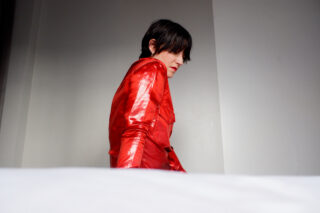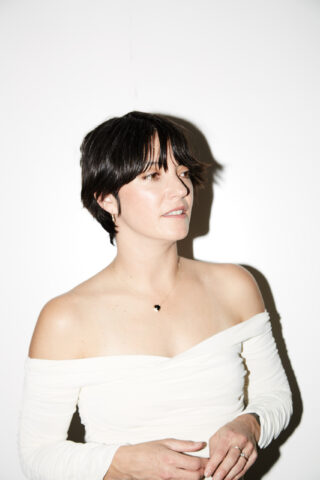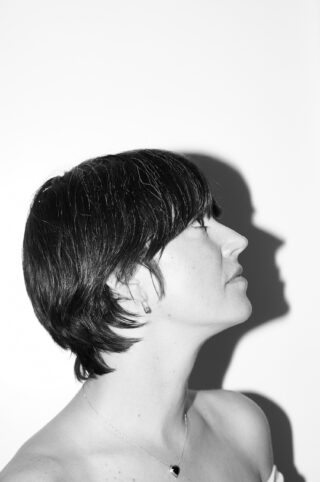Sharon Van Etten: this too shall pass
A raw expression of personal and societal tumult, the beloved songwriter's new record is a testament to resolve

A raw expression of personal and societal tumult, the beloved songwriter's new record is a testament to resolve
What with the release of standalone singles ‘Porta’ and ‘Used To It’, a contribution to Ben Gibbard’s Yoko Ono tribute record, and the announcement of this summer’s Wild Hearts Tour – a 23-date jaunt across the US also starring Angel Olsen, Julien Baker and Spencer – the first quarter of 2022 has been anything but quiet for Sharon Van Etten. Now she’s taking things up another gear entirely with the surprise release of her stunning sixth studio album, We’ve Been Going About This All Wrong.
Written in the context of Covid, civil unrest and the wildfires in her adoptive home of L.A., the self-produced collection sees Van Etten digging deeper emotionally than ever before, confronting past trauma, her own mortality and the perpetual emotional tug-of-war that is motherhood. But for all the darkness – and it gets pretty pitch-black on ‘Born’, which begins, “I was never like her, I laugh as I am knocked down” – there is defiance.
You can hear it in the celebratory chorus of ‘Mistakes’, which finds Van Etten declaring, “When I make a mistake, turns out it’s great,” over a synth-driven melody that’s as close to pure pop as anything the New Jersey singer has attempted yet. It’s there too in her fantastically droll choice of title – purloined from a schmaltzy kids movie – and in one of the record’s most minimal moments, ‘Darkish’. “It’s not dark, it’s only darkish,” she consoles over acoustic guitar and the gentle flutter of birdsong, firmly wresting hope from the ashes.
“I do believe we will get past this pain,” she told me at the beginning of March, thoughtfully sipping coffee in the restaurant of an East London hotel. “But it’s only by seeking connection with other people that we’ll get through it.” As Van Etten knows all too well, there are no quick fixes for moving past trauma. But viewed as part of a continued dialogue, We’ve Been Going About This All Wrong serves as a very strong opening gambit.

Gemma Samways: Last time you spoke with Loud and Quiet, you and Angel Olsen were joking about the possibility of doing a collaborative tour. Did you actually already have it booked?
Sharon Van Etten: No, we were trying to figure out if it was even possible. Because we’d talked about making a record together, maybe even writing together, but we all know the realities of the world. Like, we weren’t even sure if we’d even be able to tour separately, let alone do a joint one.
GS: But it’s happening this summer! Are you excited?
SVE: Yeah, it’ll be great! With Julien Baker and Spencer too. We still have to figure it out but I’m sure it’ll be a little bit of a band camp on the road.
GS: Have you known Julien long?
SVE: I saw her first New York show! It was pre-baby, so maybe around 2015/16. We’ve kept in touch ever since and just seeing her thrive and learn how to dictate the things that she wants in her career has been so nice. But, you know, she toured so much, and then she did the Boygenius stuff [with Lucy Dacus and Phoebe Bridgers]. And I had a kid. So we hadn’t reconnected in a while until recently.
GS: How old is your son now?
SVE: He’s gonna be five in a week!
GS: How’s he getting on?
SVE: He’s great. He’s very driven, and likes to consume everything: he’s super into music and movies and skateboarding. He’s learning how to read. You know, he’s thriving and learning how to miss his mom.
GS: Mum guilt is real.
SVE: So real – oh my god. And they change so fast. Like, as soon as you feel like you get used to a stage they wake up and they’re a different person. I swear his head is bigger some mornings or he’ll add words to his vocabulary in 24 hours.
GS: You discuss that guilt on ‘Home To Me’, most explicitly in the opening line: “I need my job, please don’t hold that against me / You are my life.”
SVE: Yeah. And I know he won’t understand it now but I put these secret messages in there that maybe years from now he’ll look back on and see. Hopefully it feels like an apology or an explanation of some kind.
GS: Later in the song you say, “So I take my time so you can say to me, what makes it right isn’t an ending.” Can you tell me about that?
SVE: Sometimes you do things you need to do because you have the conviction in your soul that it’s what you need to do. And you don’t have an explanation all the time. People ask me all the time, “When did you decide music was what you were supposed to do?” My partner and I have a joke where it’s like, I don’t know what I’m doing: I’m just doing it. You know, I had the drive and I had this passion in me. And I still don’t really know what the right thing to do is but I feel compelled to share in this way.
GS: Does your son have any concept of what it is you do? Or how cool it is?
SVE: It’s funny, I feel like he is going to rebel against it at some point. But at the moment he loves music. He plays drums so he idolises my drummer, Jorge [Balbi]. And my partner was a drummer before, so maybe it’s just in his soul.
He came on tour with me in 2019, when I was supporting Bon Iver. I’d come off stage, give him a big hug, wash off my makeup, put on my real clothes, and I would ask him if he would want to go see a part of the show. He was like, “Yeah, sure.” And, you know, these are huge shows for Bon Iver. So I’d take him into the house, and we’d get to these seats up high, and after one or two songs he was like, “It’s too loud. There’s too many people.” So I didn’t get to see their set the whole time, but I got to go to bed every night at a decent hour. [Laughs]
GS: Speaking of touring, in a 2019 interview with The Ringer you said, “One of the things that made me want to take a break from the road, is that I was singing all these really dark, intense songs about relationships I was in, and I was reliving a lot of the pain, constantly.” Have you figured out a way to balance that now?
SVE: I mean, I feel like a lot of what I wrote about before was past relationships. And I started feeling self-conscious about going through a breakup and writing about it, and then I’d have to perform these songs. Like, on the surface, it just looks like I’m an ex-girlfriend complaining, when actually – for the most part – I have come to terms with a lot of it. I’m not resentful and I’m not angry, but I was hurt, and I wrote these things and I feel better. But also, do I sound like a spiteful person by performing these songs?
But, you know, I feel like I’ve made amends with most of that past and most of what I’m writing about now has nothing to do with that. I’m reflecting on who I am and what I’ve been through, but also in the context of this universal crisis that we’ve all experienced. So it’s not as simple as an ex anymore.
GS: Would you say you were feeling more vulnerable writing this album than you had felt on previous records?
SVE: Oh my gosh, well, on which level, you know? I moved to Los Angeles from New York in September of 2019, when I finished the Bon Iver tour, and we finished the studio that we were building out in the garage in January of 2020. And then Covid hit. It was like the universe was calling my bluff, like, “Oh, you wanted to move to L.A. and figure out how to work from home? Here you go.”
The rug was pulled out from under all of us, you know: I’m not unique in having all these feelings. But at the same time, [it’s hard] when you’re a parent and you’re trying to answer questions about what’s happening. Because our kids are at an age where they can’t be scared. There’s no bad guys, there’s no war, nothing is gonna hurt you. But at night when I’m sitting in bed and everyone’s asleep in the house, it’s like, I really hope that’s fucking true. Like, I’m doing everything I can to protect my family, but what if it’s not enough? But all you have is right now, and you protect them to the best of your ability. You can’t afford to second guess yourself there.
GS: Speaking of second guessing yourself, on ‘Mistakes’ you talk about the joy of embracing failure. Has that been a recent realisation for you?
SVE: I mean, yes, but actually that song is kind of a joke. It’s about my dance moves, and how bad they are. [Laughs] I’m just not a good dancer, but now I’m older I’ve learned not to care. After a really intense day, we just put on music and have a family dance party. And it’s nice to not care about what you’re doing. I remember years ago, when I first moved to New York in my early 20s, I’d go out and be panicking, like, I can’t be here, I don’t know how to dance! But I feel like now I’d just be able to lose myself.


GS: Can we talk about the album title? Who is the ‘we’ in We’ve Been Going About This All Wrong?
SVE: [Laughs] It’s funny, because I actually stole the line from The Sandlot, this feelgood, coming-of-age baseball movie for kids we’d watch as a family through the pandemic. There’s a scene where the kids lose their last baseball over a fence, and they use a vacuum cleaner to get it back. And when they finally manage to pick the ball up with the vacuum, this dog chomps it and the vacuum cleaner blows up in the boy’s face. And he looks at his friends – and he’s covered in dirt – and says, “We’ve been going about this all wrong.”
I was laughing and crying while watching that scene, because you know that feeling where you feel like you’re over a hump and then something else happens, and you get through that and then something else happens? Like, how many times have we experienced that? This last couple of years I’ve been going through this on so many different levels, between Covid and work and protests and fires and earthquakes. But that sentiment is just so simple: sometimes you’ll fall in your face, no matter how hard you try.
GS: In spite of this, the album has quite a hopeful arc to it.
SVE: I mean, I’ve tried to put that in there. You know, my mom always said, “This too shall pass.” You just have to take a deep breath, be your best self and keep going. That’s the best I had to work with. And even when I felt most out of control, I had this album; this whole little world that I was able to create, in the midst of everything.
GS: Can you tell me more about that arc, and the sequencing?
SVE: Between the key changes and mood changes, I tried to give space if space was needed; to give people a breath from intense songs. Like, if the emotion’s too much, give them ‘Mistakes’. But I tried to begin and end with light. So it starts ‘Darkness Fades’, which is about dealing with depression and this collective weight, and trying to let people know that those feelings will fade. And the middle part of the album explains why I’m feeling this way.
‘Darkish’ is actually an older song that I never found a place for because it was kinda apocalyptic-sounding. So when it suddenly felt like the world was ending, I was like, “Oh, actually, this could fit…” [Laughs] And then it ends with me looking at my life and my family from a distance on ‘Far Away’, just hoping for the best even when I’m not around.
GS: Tell me about your decision not to release any singles from the record?
SVE: As a fan, I get bummed when you’ve heard half the record before it even comes out. And I made this record in this time period that represents a narrative, and I took time with the sequence. I want to give fans the opportunity to be able to engage in it in the way that I intended, which is listening to it front to back, experiencing that rollercoaster of emotions.
People will engage with it in their own way, of course, and I realise it’s a lot to ask of people to listen to the album in one sitting, because who has that kind of time? But, for the superfans, I want them to be able to listen to it without having heard all these singles that my team thinks will get attention because of their immediacy, but that never could represent the whole album.
GS: It’s a bold move. And slightly at odds with streaming culture.
SVE: Yeah. But I want to challenge my audience, and I want to challenge the people that I work with. However it plays out, I feel like it will be informative of who my fans are and how they engage with my music. At the end of the day I just wanted to try something different, because I have been doing the same thing for so long now.